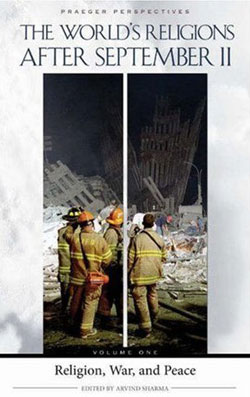
Reviewed Rev Seforosa Carroll, Convener of Assembly’s Relations with Other Faiths Working Group
Praeger Publishers, Connecticut, 2009
This four-volume set looks at the impact of September 11 on interfaith relations and world religions according to the following four themes: Religion, war and peace; Religion and human rights; the interfaith dimension; and spirituality.
Each volume carries a theme, which is explored from a variety of faith perspectives making this collection, in my view, a truly collaborative interfaith project. Many of the articles contained in these volumes were papers presented at the Global Congress on World’s Religions after September 11, in Montreal, September 11-15 2006.
The Editor, Arvind Sharma skillfully brings these articles together giving space and voice to ‘multifaith’ perspectives.
The first volume Religion, War and Peace explore how the concept of just war has been revisited in the religious context of Christianity and the regional context of South Asia. The difference between war and terror is highlighted and examined. In this volume the idea of ‘peace as an equilibrium rather than a complete absence of tension’ is considered as an antidote to war and terror.
The second volume Religion and Human Rights explores the relationship between religion and human rights, by examining religions and human rights in general and human rights in relation to individual religious traditions.
The third part of this volume is in the form of a proposal considering the possibility of moving toward a Universal declaration of Human rights by the world’s religions.
The third volume, The Interfaith Dimension deal with living with plurality or a “plural vision” in specific contexts. Writers in this volume advocate and broaden the concept of a plural vision or perspective highlighting its depth, richness, complexity and problems.
Finally, the fourth volume Spirituality, as the editor of this four set volume, Arvind Sharma states, ‘offers a glimpse of how things begin to appear when viewed through the lens of spirituality rather than religion’.
In this volume spirituality is explored within a specific religious tradition (namely Christianity and Hinduism) then in relation to feminism, the environment, science and the new religious movements.
This four set volume is truly impressive. It surveys current methodologies and current thinking on issues relating to religion, bringing religion into dialogue with issues in the current millennia.
The articles in each volume give considered attention to the particular theme they are addressing, evaluating and critically assessing different aspects of the theme thereby providing the way for further discussion and deliberation. I was impressed most of all by the way each theme in each volume was explored by various faith perspectives.
 JourneyOnline
JourneyOnline






